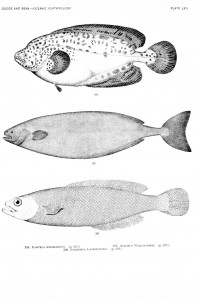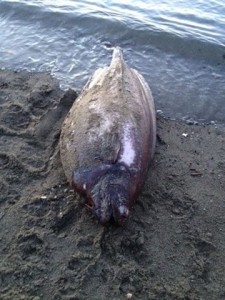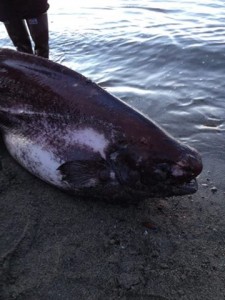Aquatic scientific names in the news …
Ragfish
A an adult female Ragfish measuring around 1.6 metres in length was found on the 7th of January washed ashore near the dock in Gustavus in Southeast Alaska (Alaska Dispatch News 7th Jan.).
Images: Glacier Bay National Park and Preserve/Facebook
A seldom seen deepwater fish whose life history is poorly documented, they are a North Pacific species with a distribution ranging from Southeastern Alaska to Japan. There is a difference in both morphology and habitat between juveniles and adults; as they grow they lose their pelvic fins and both the dorsal and anal fins reduce, at one time the different life stages were considered to be two separate species; adults occur near bottom usually at depths from 18 to 732 m (1420 m max. recorded) while juveniles can be found in shallow water or offshore near the surface.
 Plate illustrating supposed species showing difference in morphology
Plate illustrating supposed species showing difference in morphology
(click to enlarge)
Icosteus aenigmaticus Lockington, 1880, the Ragfish
Etymology.
Icosteus – Greek, Ic-, eikw (εικω), yield, give way; –osteus (οστεον), bone. Loosely speaking – yielding bones.
aenigmaticus – Latin, like an enigma, obscure, enigmatic.
From the original description where the derivation of the common name can be seen:
Etymology: εικω, to yield; οστεον, bone.
Vertebrae numerous; vertebral column highly flexible and soft.
Cranial bones tolerably firm, those of the face and opercles, &c., highly, flexible.
Entire body characterized by a lack of firmness, as it can be doubled up as readily as a piece of soft, thick rag.
Lockington, W. N. 1880 Description of a new genus and some new species of California fishes (Icosteus aenigmaticus and Osmerus attenuatus). Proceedings of the United States National Museum v. 3


